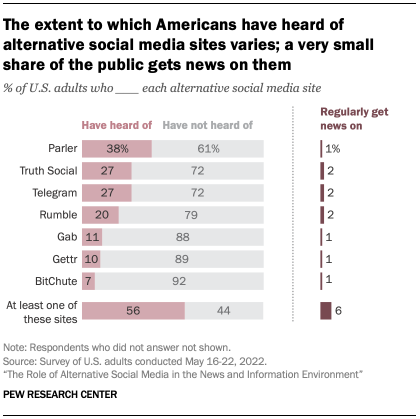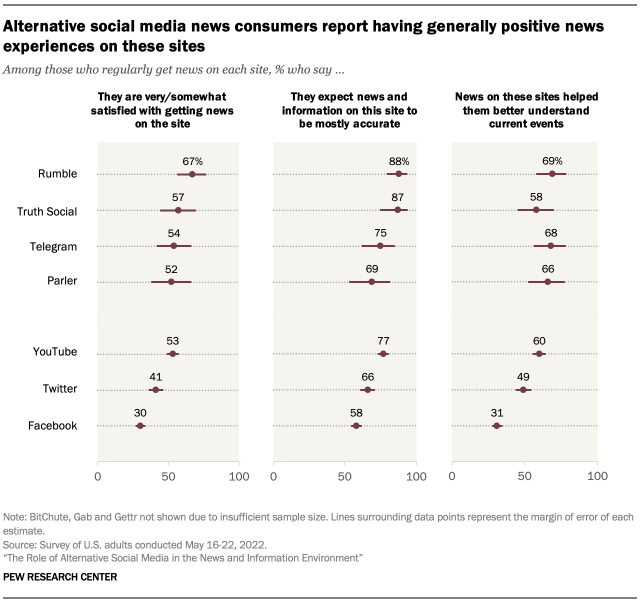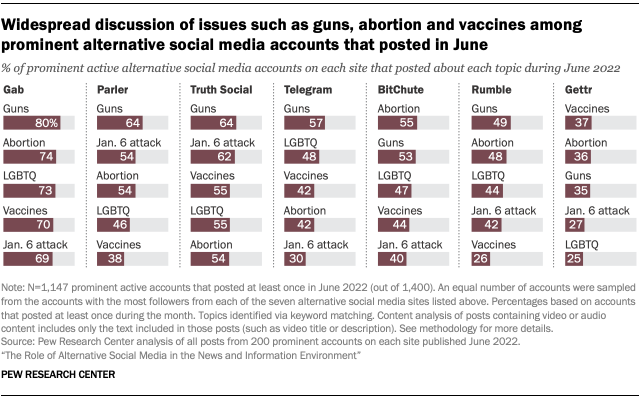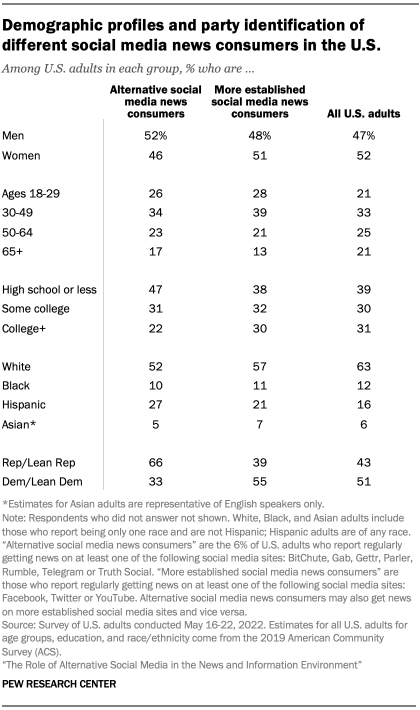
Donald Trump is running for U.S. president for the third time. But as his campaign gets underway, it will be without two prominent communication tools he used in earlier campaigns: Facebook and Twitter. At the end of Trump’s one term in the White House, both social media platforms suspended him for his posts about the Jan. 6 attack on the Capitol. (Note: Trump’s Twitter account was reinstated shortly after this post was published, though he has indicated he won’t return to the site.) Soon after, he founded his own media and technology company, which created a new alternative social media site called Truth Social in early 2022.
Truth Social was launched into a crowded social media universe that has seen several new options emerge in recent years. Many of these new social media sites explicitly present themselves as alternatives to more established platforms, especially by opposing free speech restrictions they say are rife at other sites.
An October 2022 Pew Research Center study took a close look at Truth Social and six other alternative social media sites that have created small but generally satisfied communities of news consumers: BitChute, Gab, Gettr, Parler, Rumble and Telegram. With Trump’s 2024 presidential bid now officially underway, here are key facts about Truth Social and its users, based on the Center’s study:
Related: Before midterms, Trump’s image among Republicans had become less positive
This Pew Research Center analysis provides data about Truth Social as Donald Trump runs for president in 2024. It is based on an October 2022 Center study that examined Truth Social and six other alternative social media sites – BitChute, Gab, Gettr, Parler, Rumble and Telegram – using a multi-method approach. Sites were included in the study if they had publicly accessible posts, were mentioned in news media, and had at least 500,000 unique visitors in December 2021.
The survey portion of the study was conducted May 16-22, 2022, among 10,188 U.S. adults. Everyone who completed the survey is a member of Pew Research Center’s American Trends Panel (ATP), an online survey panel that is recruited through national, random sampling of residential addresses. This way nearly all U.S. adults have a chance of selection. The survey is weighted to be representative of the U.S. adult population by gender, race, ethnicity, partisan affiliation, education and other categories. Read more about the ATP’s methodology here. Respondents were asked about their familiarity with each of the seven social media sites studied. Those who reported having heard of these sites were also asked whether they use the sites and get news there, how they feel about them, and more.
The margin of sampling error for the full sample of 10,188 respondents is plus or minus 1.6 percentage points; the margin of sampling error for the 587 alternative social media news consumers is plus or minus 7.0 percentage points; and the margin of sampling error for the 219 Truth Social news consumers is plus or minus 11.9 percentage points.
The audit of alternative social media sites was initially conducted in April 2022. To conduct the analysis, a team of researchers were trained on a set of variables that examined features of each site like its privacy and moderation policies. Researchers reexamined each site in August-September 2022 (Truth Social was also rechecked in November 2022) and updated findings with any changes.
The account content analysis examines a sample of 200 prominent accounts on each of the seven sites included in this analysis, for a total of 1,400 examined accounts. Prominent accounts were sampled from the 5% of accounts with the highest number of followers on each site. A team of trained researchers analyzed these 1,400 sampled accounts to determine who runs the account, their political orientation, values, and other characteristics. For more details on how accounts were identified and sampled, read the methodology.
The content analysis of posts examines the topics discussed and sources cited in 585,470 posts published in June 2022 by the 1,400 sampled accounts (only 1,147 of these accounts posted at least once that month). Researchers used a set of unique keywords to identify posts about five distinct topics – abortion; guns, gun control and shootings; the Jan. 6 attack on the U.S. Capitol; LGBTQ issues; and vaccines. Researchers looked at unique two- and three-word phrases that were commonly used in posts on each topic. Researchers then examined the unique domains linked to in these posts to identify the types of sources these accounts were using.
Here are the questions used in the study, detailed tables, and the methodology.
Pew Research Center is a subsidiary of The Pew Charitable Trusts, its primary funder. This is the latest report in Pew Research Center’s ongoing investigation of the state of news, information and journalism in the digital age, a research program funded by The Pew Charitable Trusts, with generous support from the John S. and James L. Knight Foundation.

- While 27% of U.S. adults say they have heard of Truth Social, only 2% use the site for news. Overall, just 6% of Americans regularly get news from at least one of the seven sites studied, and no single site is used for news by more than 2% of U.S. adults. In comparison, many more Americans use more established sites for news, including Facebook (31%), YouTube (25%) and Twitter (14%).
- Truth Social identifies itself as a platform for free speech – but the evidence of this is mixed. The Google Play store initially rejected the Truth Social app because it did not remove posts that incited violence (though the store did make it available after the site took more steps to moderate these posts). In contrast, there have also been reports of Truth Social blocking content due to the political views expressed, and the site’s terms of service prohibit sexual and violent content.
- Many of those who get news on Truth Social report having positive experiences. Among the 2% of U.S. adults who regularly get news there, 87% say they expect the news and information there to be mostly accurate, while 13% expect it to be mostly inaccurate. Around six-in-ten Truth Social news consumers (58%) say the news they got there helped them better understand current events, while 17% say it made them more confused about current events.
A large share of those who regularly get news on Truth Social (57%) say they are very or somewhat satisfied with the experience, while 25% are very or somewhat dissatisfied and the rest give a neutral assessment. Additionally, 59% of these news consumers say the discussions they see on the site are mostly friendly, while 16% see mostly unfriendly discussions and 25% say they see about an equal mix of friendly and unfriendly discussions.

- Although Truth Social identifies itself as nonpartisan, many prominent Truth Social accounts are right-leaning or pro-Trump. The Center’s recent study examined 200 prominent accounts on Truth Social, selected from those with the most followers. As of June 2022, the vast majority of these accounts (94%) are individuals while 3% are organizations. And a majority of these accounts (83%) have values or other appeals in their profiles.
About half of these 200 accounts (49%) have a reference to being right-leaning or pro-Trump in their profile – higher than any other alternative social media site studied. In addition, 44% of prominent accounts express a religious identity, and 43% have a reference to patriotism or a pro-America message.
- Guns, the Capitol riot and vaccines are among the subjects that prominent Truth Social accounts focused on in June 2022. A review of posts from these 200 prominent Truth Social accounts found that 64% posted about guns and gun rights in June 2022, 62% posted about the Jan. 6 attack on the Capitol, 55% posted about vaccines, 55% posted about LGBTQ issues and 54% posted about abortion. (These posts came amid widespread discussion of several high-profile shootings and the Supreme Court’s decision to overturn Roe v. Wade, and at a time when a U.S. House committee was investigating the Jan. 6 Capitol riot. Vaccinations and LGBTQ issues were also regularly in the news.)


- About two-thirds (66%) of those who regularly get news from any of the seven alternative social media sites studied by the Center – including Truth Social – identify as Republicans or lean toward the Republican Party. This is far higher than the share who identify as Democrats or lean Democratic (33%). By comparison, those who get news on at least one of three more established social media sites studied by the Center – Facebook, Twitter and YouTube – are more likely to be Democrats or Democratic-leaning than Republican or Republican-leaning.
Note: Here are the questions used in this study, detailed tables, and the methodology.